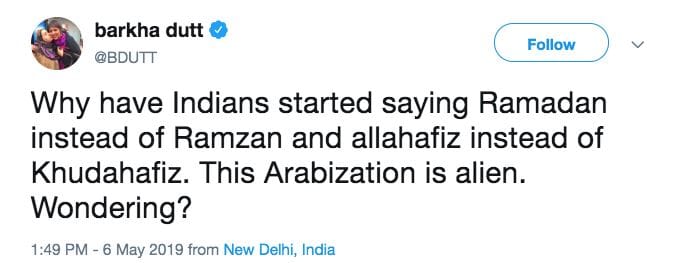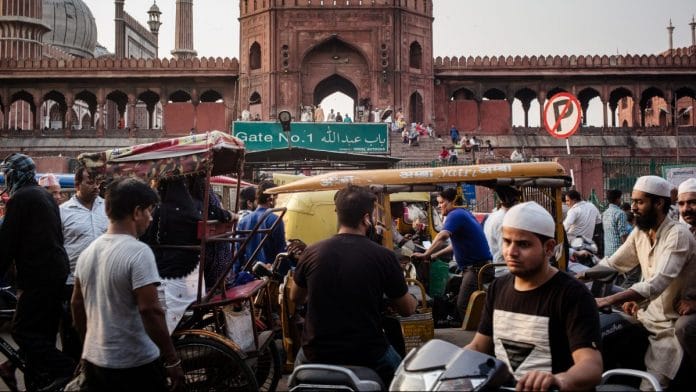The debate over whether to write the current month of the Islamic calendar with a ‘d’ as in Ramadan or ‘z’ as in Ramzan continues to rage on Indian social media. The traditional spelling of the word in the Indian subcontinent has been Ramzan. However, Ramadan has lately become part of the linguistic repertoire of Muslims in the country.

Many wonder about the reasons for the shift in the spelling from ‘z’ to ‘d.’ Some describe it as a reflection of the Muslim elite’s desire to shun the composite Indian culture and align with the Saudi brand of Islam. For them, in the innocuous change in the spelling from ‘z’ to ‘d’ lies a larger ideological shift towards Wahhabism, an extremist version of Islam. Others have linked the shift specifically to the radicalism of Muslim tele-evangelists.
As a sociolinguist who has studied social meanings of language in general and Urdu in particular, I am shocked at such superficial explanations. Not only are they empirically incorrect, but they are also equally politically motivated. People with vested interests use such explanations to propel their own agenda to corner Muslims.
Also read: Major Ramzan crisis for Indian Muslims — no RoohAfza in the market
Letters and sounds
First, consider the linguistic aspect of the issue. The name of the month contains the letter ض, which is pronounced similar to ‘d’ in Arabic.
In both Persian and Urdu, into which the word was borrowed centuries ago, the original pronunciation didn’t survive. Instead, it was replaced with the sound ‘z’. Consequently, it was written as Ramzan. Such borrowings and the accompanying loss of pronunciation are common in many languages.
In Hindi, for example, the letter ष is written but not pronounced like it was in Sanskrit. In Hindi, the sound of this letter has merged with that of the letter श. My own name contains the same letter ض . It has two different pronunciations, both of which I use depending on the context. While talking to Arabs in Arabic, I introduce myself as Ridwan, for Urdu/Hindi speakers I am Rizwan.
Also read: Waqt, chaawal and Bollywood — the deep relationship between Indians and Arabs
Globalisation: Language on the move
The shift from Ramzan to Ramadan is a by-product of globalisation accompanied by extraordinary advances in science and technology. Globalisation has brought languages and people in contact with each other in ways that were not possible earlier. Today, more Indians are travelling overseas for work and leisure than they did in the past. Of all places, the Gulf countries continue to be a major attraction for Indians.
Having worked in the Gulf, Indians not only brought home foreign remittances but also some of its cultural and linguistic items. On special occasions, one can see some Muslims wearing a thawb, a long white robe worn by Arabs. As I have written before, the linguistic influence of the contact between Indian and Arabs is evident in the popular use of some Arabic words in Indian languages – for instance, khallas (finished). The word khallas has become a part of popular culture in India.
Like the word khallas, the Indian expats brought with them the original Arabic d-version of the word believing that the correct form was Ramadan. Given that the word is Arabic, it is not surprising that they accepted the Arabic spelling norms.
Globalisation and developments in communication also brought people from different parts of the world in conversation with each other. On Twitter, we notice this all the time. The name of the month outside of the Indian subcontinent, including the English-speaking world of the UK, US and Canada, has always been spelt Ramadan to reflect the d-like Arabic pronunciation in Arabic. Evidence of this can be seen in the frequency of use of the words Ramadan and Ramzan in English newspapers.
A quick search of the phrase “the month of Ramadan” on the database Lexis Nexis Academic for the New York Times alone returns 1,000 hits, whereas the same phrase with Ramzan returns only three documents, all written by a Pakistani writer. This writer interestingly adds a clarificatory note: ‘also known as Ramadan in the Middle East’.
With the rise of the electronic and social media, Indian readers — Muslims and Hindus alike — began to discover that their month of fasting is also spelt Ramadan not only by Arabs but the rest of English-speaking world as well. Faced with the two competing forms, Urdu speakers have chosen the newer form. The appeal for newness may partly be because of its proximity to Arabic.
The shift to Ramadan is similar to how many Indians who have lived in the US, on their return start pronouncing ‘r’ in words such as ‘car’ and ‘far’ in an American way. They use ‘movie’ instead of ‘film’. Another telling example of the globalisation of language is the adoption of American hip hop music in Indian films. A recent film, Gully Boy, shows the popularity of this Western genre being adopted into an Indian story.
Also read: Urdu sounds are disappearing from Bollywood songs
However, we hardly see any debate about such foreign influence in Indian languages and films.
Finally, the Ramadan-Ramzan controversy is restricted mostly to the writing. Seldom do people use the d-like pronunciation in their verbal conversations, e.g. “Main agle ramadan mein tumse milunga (I will see you next year in Ramadan)”. They prefer the traditional z-spelling of Ramzan. For this reason, in Persian in which the word is actually pronounced with a ‘z’ sound, Ayatollah Khamenei, while tweeting in English, used the more prevalent d-spelling of the English-speaking world.

The media-propagated Ramadan-Ramzan controversy is not related to Wahhabism or radical Islam. Instead, it is the result of the globalisation of language and its use and meanings. We live in a world where our linguistic behaviours, like other social practices, are in flux due to mutual influences. The linguistic cross-fertilisation is giving birth to new linguistic forms. Ramadan is one of them.
The author is Associate Professor of Sociolinguistics, Department of English Literature and Linguistics, Qatar University, Doha. Views are personal.







I get it that it should be Ramadan because in Arabic, it’s a ‘d’ not a ‘z’. Whereas in Persian and Hindi a ‘z’ got added. But why is there an extra ‘a’ sound before ‘d’ which is not there before ‘z’?
Rizwan explains with an analogy that when he introduces himself to someone Arabic, he says Ridwan as his name not Rizwan. I get that. But why is his name not Ridawan then? If someone is called Humza, in the Gulf he would be Humda or Humada?
What Ridwan does not explain here is that it’s not as if there is no ‘z’ in Arabic, or that all ‘z’ become ‘d’ when spoken in Arabic. Because a Zafar will be called Zafar even in Arabic. Saffron will never be called Daffraan. There is a place called Al-Muzahmiya just outside Riyadh which is not pronounced Al-Mudahmiya.
We used to say Ramzaan not Ramazaan. So that ‘a’ before ‘d’ was dropped when it got converted from Ramadaan to Ramzaan.
Because my brother zaffran contain letter ز which sound “z” and Zafar contains letter ظ which also sounds similar to”z”. So, please check arabic language before thinking it from one side.
Complete nonsense, globalisation and all. Muslims use Ramdan instead of Ramadan because it feels good to them; as indians feel good and consider better every thing that is imported. Second, Televangelists and Wahabism has much influence. Author’s view is complete whitewashing the facts.
Useless controversy linking the use of correct Arabic pronunciation to so- called Wahhabism. In Urdu Ramzan is still valid but Ramadan in Arabic is more appropriate.If you spell restaurant in French style and correctly you are not accused of fundamentalism.It seems Burkha is in search of issues to be seen even-handed.
Ridhwan or Rizwan Yourself?
رضوان
Lighter Note …..
Very interesting article and yes we – the people of subcontinent should stick to their own language – Ramzan. No need to be influenced by the Arabs.
The author’s argument on ‘language on the move’ is sound and perhaps the main reason for this change. Allah has been an integral part of communication in the Indian subcontinent. Just two examples:.’Hai Allah’; ‘Allah tumble salamat rakhe’. Also, any Indian (Hindus included) working in the Middle-East will say ‘Ramadaan’ and ‘Insha-Allah’ with as much ease as ‘Good Morning’ or ‘Namaskar’.
This is a completely rubbish and unnecessary allegation that pronouncing Ramadan is linked to spread of Wahhabism or it showed Indian Muslims’ inclination towards Arab culture. I am surprised that self-proclaimed liberals like Bakha Dutt are peddling this propaganda. The usage of Ramdan is limited to only Facebook posts and Whatsapp forwards. In verbal communication, Indians still say Ramzaan. Moreover, in rural areas of eastern UP, Bihar, Jharkhand and in entire Bengal people even say RAMJAAN instead of Ramzaan or Ramadan. And linking Allah Hafiz with Arabs is the height of ignorance. Arabs never say Allah Hafiz, moreover the rule of conjugation used here has been taken from Urdu/Hindi; it is alien to Arabic language. For good bye – Arabs use “Fi Aman Allah” or “Allah Ahfezak Ma’Assalama”… Interestingly, there is no raging debate on the usage of DIPAWALI instead of the more popular DIWALI and VIJAYDASHMI instead of DUSSEHRA… !!!
Err….. In South India it was always Deepawali never Diwali. As for Dushera it was always Vijayadashmi in South India. In fact different regions in India have local names for the same festival.
Writer forgot that word is just use as metaphor to discribe the wahabi influence on Indian Muslim. You are saying that due to migration to Arab world this happen. I am asking one question Muslim are living in India since 1000 years how much their culture affected by local tradition and culture. It is not ramdan or ramzan but belief that whatever Arab Muslim do,speak ,wear are symbool of true muslamam.is trivializing.
Why the fuss about ….. Why the religion is being discussed when it’s personal to everyone….. The writer has wrongly made it a debatable issue by quoting “some vested interests to corner Muslims”……. Who is cornering Muslims Sir…. The firstly it’s quoted by Tarek Fateh and then by so called Secular media people like Barkha Dutt who is married to Kashmiri Muslims over the years……. Then who is cornering Muslims with vested interests…… The rise of right wing in India has given a tool to so called Sikulars, Leftists media to beat with….. The writer is Qatar based and may not be knowing the nitty gritty of Indian politics which has become so much vicious that everything wronged with Muslims, is attributed to Right Wing’s rise, which is not the case, atleast here. In nutshell, in the hot political debate over Muslims Vs. every other religion world over, it is better not to discuss controversial issues in the media in order to die the issue it’s own death….. Otherwise, the people with little knowledge or with vested interests take advantage of the situation….. Yesterday only, the writer might have seen an article by one so called Sikular/Leftist/Liberad/Lutyens Love Boy, on the shortage of RoohAfza in Indian market giving the impression that it might have created by the present Right Wing Govt of India….. Immediately after that, the so called Sikulars’ brigade started retweeting his article as if there is no other issue on the earth….. Poverty hunger farmers etc. have been resolved and only RoohAfza is required now……. My sincere request not to discuss religion at all which is personal issue….